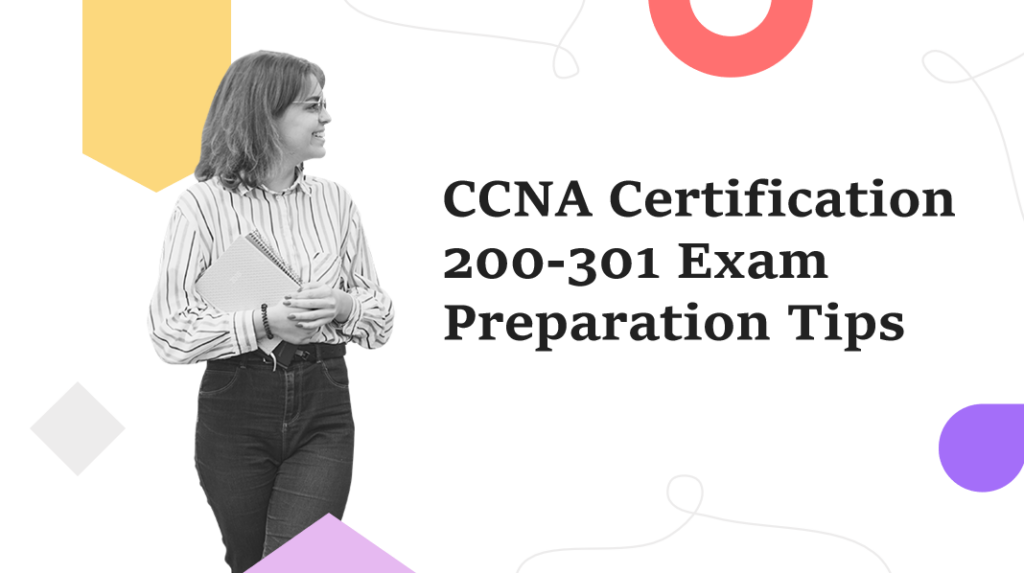CCNA Certification 200-301 Exam Preparation Tips
What is CCNA 200-301 exam?
The CCNA 200-301 exam is a certification exam offered by Cisco. It is designed to test the candidate’s knowledge and skills related to networking fundamentals, network access, IP connectivity, IP services, security fundamentals, and automation and programmability. The exam consists of multiple-choice questions, drag-and-drop questions, and simulations. It is intended for individuals who are interested in starting a career in networking or want to enhance their existing networking skills. Passing the CCNA 200-301 exam is a requirement for obtaining the CCNA certification, which is a widely recognized credential in the networking industry. The certification validates the candidate’s knowledge and skills in networking technologies and provides a competitive advantage in the job market.
Exam Format: The exam is composed of 120-125 multiple-choice and simulation questions, and you have 120 minutes to complete the exam.
Exam Cost: The cost of the exam varies depending on your location, but it typically ranges from $300 to $400 USD.
Exam Topics: The exam covers a broad range of topics, including networking fundamentals, network access, IP connectivity, IP services, security fundamentals, and automation and programmability.
Exam Prerequisites: There are no formal prerequisites for the CCNA 200-301 exam, but it’s recommended that candidates have at least one year of experience with networking technologies.
Passing Score: To pass the exam, you need to score at least 825 out of 1000 points.
Exam Registration: You can register for the exam through the Cisco website or through an authorized Cisco testing center.
Exam Validity: The CCNA certification is valid for three years, after which you need to recertify.

What knowledge will test for the 200-301 CCNA exam?
- Networking Fundamentals: This exam objective covers the basics of networking, including networking concepts, network models, and network topologies. It also includes topics such as the OSI and TCP/IP models, IP addressing, and subnetting. Candidates are expected to have a solid understanding of these concepts to pass the exam.
- Network Access: This exam objective covers the technologies and protocols used to connect devices to a network, including Ethernet, wireless LANs, and WAN technologies. It also includes topics such as VLANs, STP, and EtherChannel. Candidates should be able to configure and troubleshoot these technologies to pass the exam.
- IP Connectivity: This exam objective covers the protocols and technologies used to enable IP connectivity between devices on a network. It includes topics such as routing protocols, OSPF, EIGRP, and BGP. Candidates should be able to configure and troubleshoot these protocols to pass the exam.
- IP Services: This exam objective covers the protocols and technologies used to provide network services such as DHCP, DNS, and NAT. It also includes topics such as QoS, NTP, and SNMP. Candidates should be able to configure and troubleshoot these services to pass the exam.
- Security Fundamentals: This exam objective covers the basics of network security, including access control, firewalls, VPNs, and wireless security. Candidates should be able to identify and mitigate security threats to pass the exam.
- Automation and Programmability: This exam objective covers the basics of network automation and programmability, including the use of APIs, programming languages, and automation tools such as Ansible and Puppet. Candidates should be able to configure and troubleshoot these tools to pass the exam.
Here are some tips and best practices to help you pass the CCNA exam with flying colors:
Review Exam Objectives: Make sure you review the exam objectives thoroughly before taking the exam. This will help you identify any areas where you may need additional study or practice.
Practice with Exam Simulators: Use exam simulators and practice tests to familiarize yourself with the exam format and types of questions that you will encounter. This will also help you identify areas where you may need to focus more study.
Hands-on Experience: Gain hands-on experience with networking equipment and software to reinforce your understanding of the exam concepts. Practice configuring and troubleshooting networking technologies in a lab environment.
Time Management: Manage your time effectively during the exam. Monitor the time remaining and allocate sufficient time to answer each question. Do not spend too much time on difficult questions and come back to them later if necessary.
Exam Strategy: Develop an exam strategy before you start. Read each question carefully and understand what is being asked before selecting an answer. Eliminate obviously incorrect answers before choosing your final selection.
Stay Calm and Confident: Stay calm and confident throughout the exam. If you encounter difficult questions, do not panic or become discouraged. Remember that you have prepared well and have the knowledge and skills to pass the exam.
In conclusion, the CCNA 200-301 exam is designed to test the candidate’s knowledge and skills related to networking fundamentals, network access, IP connectivity, IP services, security fundamentals, and automation and programmability. Candidates who pass this exam earn the CCNA certification, which is a widely recognized credential in the networking industry. By mastering the exam objectives, candidates can enhance their networking skills and advance their careers in the IT industry. By following these tips and best practices, you can increase your chances of success and earn your CCNA certification. Good luck!


LEAVE A COMMENT